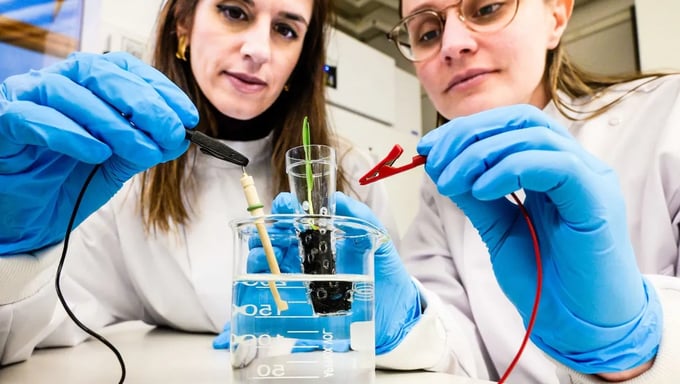May 21, 2025 | 05:57 GMT +7
May 21, 2025 | 05:57 GMT +7
Hotline: 0913.378.918
May 21, 2025 | 05:57 GMT +7
Hotline: 0913.378.918

Researchers connect the eSoil to a low power source for stimulating plant growth.
Hydroponics is the technique of growing plants using a water-based nutrient solution rather than soil. This approach minimizes water consumption appreciably and retains all essential nutrients within the system, a feat unattainable in conventional agricultural practices.
Hydroponics is also used in vertical farming to grow lettuce, herbs, and other vegetables.
This soil, which the researchers named eSoil, conducts electricity and is designed specifically for hydroponic farming. Their experiments found that barley plants grown in this electrically conductive soil grew 50% more in just 15 days when their roots were given an electric boost.
“In this way, we can get seedlings to grow faster with less resources,” said Professor Eleni Starvrinidou, first author of the study and associate professor at Linköping University.
“We don’t yet know how it actually works, which biological mechanisms that are involved. What we have found is that seedlings process nitrogen more effectively, but it’s not clear yet how the electrical stimulation impacts this process,” she added.
The researchers explained that in hydroponics, people often use mineral wool to grow plants, but it's not good for the environment and takes a lot of energy.
Whereas, eSoil is made up of cellulose and a conductive polymer. This mix is not new, but it's the first time it's used for growing plants this way.
Before, researchers used high voltage to help plants grow, but eSoil uses very little energy and is safe. The scientists think this study will lead to more research on hydroponics.
Pointing out that currently, the world is facing a double whammy of a growing population and climate change, Professor Eleni Stavrinidou, leader of the Electronic Plants group, said that “it’s clear that we won’t be able to cover the food demands of the planet with only the already existing agricultural methods.
“But with hydroponics we can grow food also in urban environments in very controlled settings,” she added.
While it may not solve all food problems, it can help in places with little space for farming and tough weather conditions.
The study was published in the PNAS journal.
(IE)

(VAN) Attempts to bring down the price of the Japanese staple have had little effect amid a cost-of-living crisis.

(VAN) Fourth most important food crop in peril as Latin America and Caribbean suffer from slow-onset climate disaster.

(VAN) Shifting market dynamics and the noise around new legislation has propelled Trouw Nutrition’s research around early life nutrition in poultry. Today, it continues to be a key area of research.

(VAN) India is concerned about its food security and the livelihoods of its farmers if more US food imports are allowed.

(VAN) FAO's Director-General emphasises the need to work together to transform agrifood systems.

(VAN) Europe is facing its worst outbreak of foot-and-mouth since the start of the century.

(VAN) The central authorities, in early April, released a 10-year plan for rural vitalization.